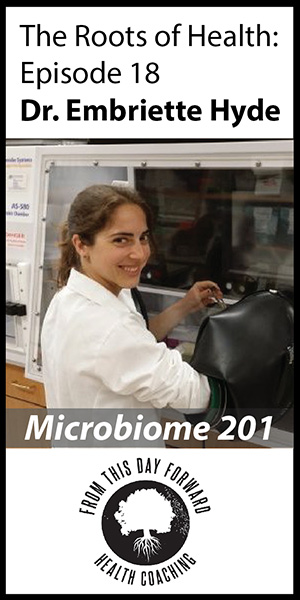 Click here to go right to the show in iTunes or on WebTalkRadio.net.
Click here to go right to the show in iTunes or on WebTalkRadio.net.
So after last week’s show, you’re no longer walking the earth blissfully unaware of the microbial communities inside of your body. (If you didn’t hear last week’s show – you might want to fire it up and listen to it before you hear this one). But why should you care about these communities? What are the health implications of culturing certain communities over others? And why should you be in awe of and maybe even a little excited about this so-called ‘forgotten organ’ that you live with?
My guest today will help to shed some light on these questions. Embriette Hyde is a post doctoral researcher who is intimately familiar with what a microbiome is, and is working to develop new protocols for characterizing microbial communities.
In Part 1 of my interview with Embriette, we learn that despite how genetically similar humans are (99.9% common human genome), our microbiota really hold the key for our ‘bioindividuality’. This could be the reason that our human health is so different, and that our requirement to gain health are really so different. Our bacterial residents may play a role in how our human genes are expressed… and they certainly play a HUGE role in the strength of our immune systems. We chat about fecal transplant as a new way to treat antibiotic resistant infections, such as Clostridium difficile. Have a listen to hear about other potential health applications of the human microbiome.
Dr. Embriette Hyde’s bio:
Dr. Embriette Hyde is a post-doctoral scholar in Dr. Rob Knight’s lab in the Pediatrics Department at the University of California, San Diego. Embriette has four years of experience in microbiome research. She completed her PhD at Baylor College of Medicine in Houston, TX working on the oral microbiome and it’s potential role in cardiovascular disease. As a post-doc in the Knight lab, she continues to work on a variety of microbiomes, including plant, Komodo dragon, and human microbiomes, and she is developing protocols for high throughput isolation and phenotyping of individual species in a community. Embriette is also actively involved in PR for the American Gut Project and is an active blogger on the American Gut site and on microbe.net.
I mention some research on the presence of the bacteria Oxalobactor formigenes in various populations, if you’re interested, you can see the poster here.
Check back next week to hear Part 2 of this interview.
You can subscribe to The Roots of Health at WebTalkRadio.net and also on iTunes.


